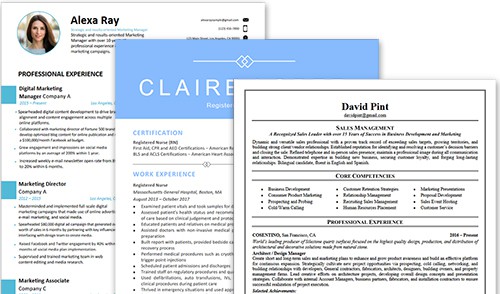What is a Resume?
What is a resume, and do you need one? if you’re searching for a job or want to apply for graduate courses, you will be asked for your resume. If you wish to apply for a college scholarship or gain admittance into a private club, you may also be asked for a resume as part of the approval process. So what is a resume, and why is it such an important document?

Resume – A Brief Overview
A resume is a one or two page document that summarizes all your qualifications as a job candidate. Your resume shows employers what degrees you have earned, positions you’ve held, skills you’ve acquired, and any achievements you’ve earned during your career. Resumes are often the first thing an employer will look at to determine whether a candidate might be a good match for their job position. Think of a resume as the first impression you will make during the hiring process.
What a Resume Does
A well-crafted resume is your ticket to landing a job interview. Resumes are never the sole deciding factor in whether an employer will offer you a job. They do, however, play an important part in whether you will be invited to a job interview or not. A resume gets your foot in the door, so you can take over and “wow” an employer during your interview in person.
What a Resume Does Not Do
A resume does not get you hired or automatically land you an interview. Just because you submit a resume when asked, does not mean you will be given a follow-up interview. Submitting a resume does not obligate an employer to contact you or even acknowledge receipt of your document.
What You Should Include
Resumes should never be static. They should be dynamically changed to reflect the skills and qualifications applicable to the job you are seeking. Here is what you should include on a resume.
1. Contact Information. This section contains your name, address, telephone number, and working email address. Adding accurate contact information gives an employer a method for reaching you.
2. Objective Statement. Think of this as a one-liner to introduce yourself to an employer. A summary of your credentials and skills is appropriate for this section.
3. Education. Include college level and higher education degrees or certificates.
4. Work History. This section will be the bulk of your resume. Include relevant work history, positions and titles, skills, and accolades or awards earned. Be sure to include dates for each job.
Make sure you include any accolades or awards for each of the positions you list. Awards are a quick way to demonstrate that you went above and beyond at your place of employment and gained recognition.
What You Should Not Include
Your resume should only include information that is relevant for the job you’re applying for. Do not include work experience or skills unrelated to your desired position. Short-term jobs that only lasted for a few months shouldn’t be added. Internships should generally be removed after you’ve been out of college for several years unless they were with a highly visible company such as Disney or Coca-Cola.
Formatting Your Resume
There are three commonly accepted formatting styles for your resume: chronological, functional, and combination.
1. Chronological – This is the most frequently used type of resume. When using this format, list your work experience starting with the most recent and finish with the oldest. Include dates worked for each position listed.
2. Functional – Instead of organizing your resume based on the timeline of your work history, functional resumes are organized by grouping the skills and work experience you have. To use this format, divide your work experiences into categories such as administration, digital marketing, or management. This is a particularly useful format to use if you’re someone who’s jumped around different fields and industries your entire career. For instance, if you’re someone who’s all over the place and worked in finance, accounting, and marketing, using a functional resume to really illustrate what you’ve done in each area may be your best bet.
3. Combination – As you might have guessed from the name, a combination resume is a hybrid of a chronological and functional resume. You group your skills and work experience together the way you would a functional resume, and then you’re also sorting them by date, the way you would a chronological resume. This format is an effective way of showcasing specific skills and work experience while also providing readers with a timeline for when things occur.
Choose the style which best suits your particular needs and the job you are applying. If you are applying for a role in the financial sector, your resume should appear scholarly and intellectual. If, on the other hand, you are applying for a graphic arts position, your resume should have some colorful flair and artistic qualities.
Resume Writing Pro Tips
1. Use an easy-to-read font. Employers receive dozens and sometimes even hundreds of resumes for a single job position. If a hard-to-read resume comes across their desk, they’re likely to ignore it and move on to the next one.
2. Keep it concise. A goal you should always have in the back of your head when writing your resume is to try and use as few words as possible to get your point across. This is why resume experts say your resume should never exceed two pages in length – any longer and you’re either too wordy or going into too much detail.
3. Keep it appealing. Use bolded or underlined headers to create distinct sections separated by at least one line of white space. Make sure your resume looks tidy and inviting to read. Clutter does not belong on your resume.
4. Pay for help. If you’re struggling with your resume and you’re wondering “how do I fix my resume” and get it just right – consider having someone write your resume professionally. At the end of the day, if you aren’t confident in your writing ability or simply don’t know all the ins and outs of resume writing, consider seeking professional help.
If you’re having trouble with formatting your resume, searching online for a template to use. There are plenty of free resume templates available, so it’s really just up to you to find one you like that gets the job done.
What are resume writing services
One of the worst mistakes you can make as someone searching for a job is do a poor job writing your resume and then end up with no job offers as a consequence.
If you aren’t an expert in all this resume writing stuff you’ve been reading about, it can actually be very a wise investment to have a resume writing service write a resume for you. Writing your own resume – especially when you don’t know exactly what you’re doing – can spell disaster for your hiring chances. A mistake here or a spacing issue there can end up getting your resume thrown our of the application process.
This is sort of where resume writing services come in. – Because it’s so difficult to write an outstanding resume, there are actually trained resume experts out there who write people’s resumes for a living. It’s sort of like how there are tax accountants to help people with their taxes. So if you’re struggling to figure out how to write a resume that’ll do you justice, it’s definitely recommended to consider hiring a professional to do the heavy lifting for you and write your resume. If you are unsure about what resume service to choose, our list of the best resume services can help: 5 Best Resume Writing Services in 2021
How much does it cost to have a resume written for me?
If you’re looking to have a trained resume professional write your resume for you, the cost of a quality resume writing service usually ranges between $200 to $500. A resume writing service charging you less than $200 is likely not going to do a quality job, while a writing service charging more than $500 is likely overpricing their services.
What is the best resume writing service to go with
It’s really hard to judge what the best resume service is because everything is so subjective and nuanced. However, if you’re looking for a well-established resume writing service with a proven track record of helping people secure more job offers, you should consider going with us, ResumeGo.
We put a heavy emphasis here on getting to know what your career goals are and what type of jobs you’re looking to apply for. That way, we can tailor your resume specifically towards those objectives in order to maximize your chances of success.
Another thing that separates us from everyone else is the research we conduct that is designed to identify the most optimal way of writing a resume. Whether it’s how long your resume should be or what should be included in your LinkedIn profile and cover letter – we take a hard look at all the factors that end up determining your success and then implement it in our writing methods. Our studies have also been covered by media outlets such as Forbes, CNBC, CBS, Business Insider, and more.
Conclusion
At the end of the day, it’s important to not only identify what is a resume, but also what makes a resume well-written and top of the line. If you aren’t confident in your writing skills or simply don’t know how to exactly approach writing your own resume, then consider paying someone to write your resume for you.
Good luck with your job search!
